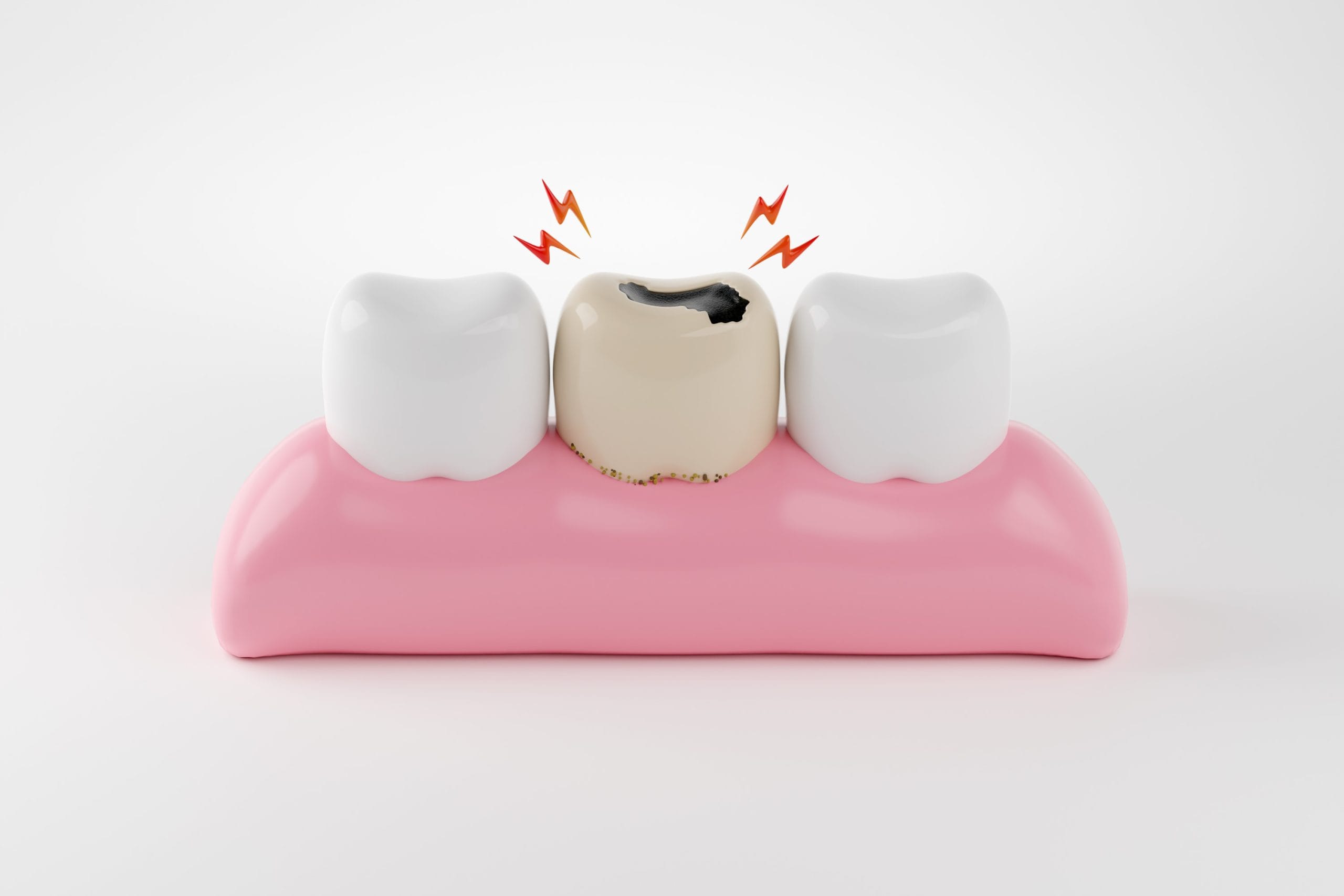A twinge of pain when you sip your iced coffee. A bit of bleeding when you floss. A dull ache that creeps in just when you’re juggling everything else.
Oral health issues tend to whisper before they shout.
Whether it’s gum inflammation, stubborn bad breath, or a tooth that won’t stop pulsing, catching the issue early means you can treat it before it escalates into something more serious.
In this article, we’re discussing common oral health problems we treat at our dental clinic in Somerset, including what to do about them. Because your oral health deserves better than “wait and see.”
TL;DR
- Oral health problems often start with subtle signs like bleeding gums, tooth sensitivity, or bad breath.
- Gum disease is common and easy to miss early on but can lead to tooth loss and systemic health issues if untreated.
- Tooth sensitivity may indicate enamel wear, gum recession, or cavities. Don’t ignore it.
- Cavities aren’t always painful at first but can cause serious damage if left unchecked.
- Toothaches or pain while chewing often signal infection, cracks, or decay that needs attention.
- Dry mouth and bad breath can point to bigger issues like dehydration, medication effects, or gum disease.
- Kids and teens face unique dental challenges like early cavities and growth-related issues.
- The earlier you address concerns, the simpler and more comfortable the solution.
Gum Disease: Easier to Miss Than You Might Think
Gum disease is one of the most common oral health problems we see and also one of the easiest to miss in its early stages. It begins when plaque builds up along the gumline, triggering inflammation.
Left untreated, that inflammation can progress into infection and eventually affect the bone that supports your teeth.
Early signs of gum disease:
- Gums that bleed when you brush or floss
- Bad breath that lingers, even after brushing
- Red, puffy, or tender gums
- Receding gumline (or teeth that look “longer” than before)
Why gum disease needs attention:
Gingivitis (the early stage of gum disease) can often be reversed. But if it advances to periodontitis, it can lead to:
- Bone loss
- Loose or shifting teeth
- Increased risk of systemic issues like:
-
- Heart disease
- Diabetes complications
- Whole-body inflammation
What helps gum disease?
✅ Booking a professional cleaning to remove hardened buildup.
✅ Brushing and flossing daily, focusing on the gumline.
✅ Seeing your dentist regularly. Early detection makes a big difference.
At Somerset Dental on James, we take gum health seriously. Whether it’s the first signs or a recurring concern, our team offers gentle, personalized care designed to protect both your smile and your overall health.
Tooth Sensitivity: Pay Attention to the Sharp Zing
Tooth sensitivity can sneak up on you. One day your morning coffee is fine, and then suddenly it’s not. That sharp, momentary jolt might pass quickly, but it’s often a signal your teeth are trying to tell you something.
Sensitivity can happen when enamel wears down or when the gums recede enough to expose the softer dentin underneath. Grinding your teeth, brushing too hard, and even certain whitening products can all play a role.
The result? A sharp or lingering pain when your teeth hit cold air, hot tea, sweet snacks, or acidic foods. And while it might seem like no big deal at first, sensitivity can point to deeper issues like cavities, cracks, or gum disease.
Tips for minimizing tooth sensitivity:
- Switching to a toothpaste designed for sensitive teeth.
- Using a softer brush (and gentler pressure).
- Avoiding triggers like icy drinks or citrus while your teeth are healing.
- And of course—seeing your dentist to get to the root of the issue.
Cavities: They Don’t Always Hurt at First
Not all cavities come with a toothache. In fact, most start without pain… just a slow breakdown of enamel as bacteria feed on sugars and release acids.
By the time you feel something? That tiny hole may have grown deeper, closer to the nerve, or even spread to neighbouring teeth.
Cavities (also called dental caries) are caused by more than just sweets. Yes, sugar intake matters, but so does how often you snack, how dry your mouth is, and how well you’re cleaning between your teeth. Even deep grooves in your molars can make you more cavity-prone.
Signs to watch for:
- Tooth sensitivity (especially to sweets or cold)
- Rough edges you can feel with your tongue
- Toothache or discomfort when chewing
- Visible dark spots or pits on your tooth
A few ways to prevent cavities:
→ Brush twice daily with fluoride toothpaste.
→ Floss every day to remove debris between teeth.
→ Limit sugary snacks and drinks.
→ Book regular dental checkups to catch small cavities before they grow.
Tooth Pain That Won’t Quit: Don’t Power Through It
You shouldn’t have to think twice before chewing on your favourite foods or wonder if that throbbing ache will finally go away on its own.
Tooth pain (whether it comes and goes or lingers all day) is your body asking for help. And the longer it’s left alone, the more complicated the fix can become.
Common culprits behind chewing pain or aching teeth:
- Cavities that have reached the nerve
- Hidden cracks or fractures
- Worn or loose fillings and crowns
- Gum recession or exposed roots
- Infection or abscess beneath the surface
Still, not all tooth pain is dramatic. That’s why even mild or occasional discomfort deserves a closer look.
If you’re experiencing a toothache or pain while chewing:
→ Don’t chew on the sore side—give it a break.
→ Avoid hot, cold, or overly hard foods until you’ve been assessed.
→ Book a dental exam sooner rather than later.
Dry Mouth, Bad Breath: Uncomfortable Signs That Something’s Off
We all experience occasional bad breath, but when it sticks around, or you constantly feel parched, it’s time to take a closer look.
Dry Mouth (Xerostomia)
Saliva plays a key role in keeping your mouth clean and balanced. When your body doesn’t produce enough, bacteria can thrive, leading to odour, cavities, and discomfort.
Common causes of dry mouth include:
- Dehydration
- Mouth breathing (especially at night)
- Certain medical conditions or cancer therapies
- Medications like antihistamines or antidepressants
Dry mouth can also make it harder to speak, swallow, and taste, affecting your quality of life more than you might expect.
Bad Breath (Halitosis)
Persistent bad breath isn’t just embarrassing; it’s often a sign of something deeper.
Common culprits of bad breath are:
- Buildup of bacteria on the tongue
- Gum disease or untreated decay
- Poor oral hygiene habits
- Dry mouth (yes, it’s all connected!)
What can you do about dry mouth and bad breath?
💡 Drink plenty of water throughout the day.
💡 Brush your tongue daily or use a tongue scraper.
💡 Stay consistent with brushing, flossing, and dental visits.
💡 Treat underlying issues like gum disease or decay.
💡 Ask your dentist about products designed for dry mouth relief.
The team at Somerset Dental on James can help uncover the root cause of your dry mouth and bad breath, then create a customized plan to restore your comfort and confidence.
Oral Health Issues in Kids & Teens: What Parents Should Watch For
From baby teeth to braces, there are unique challenges that show up as kids grow. And while many issues are common, that doesn’t mean they should go unchecked.
Some of the most frequent concerns we see in children and teens:
🦷 Cavities (Yes, Even in Baby Teeth)
Tooth decay can start earlier than you think. Baby teeth are more prone to cavities due to thinner enamel and inconsistent brushing habits. Early decay can also affect the development and spacing of adult teeth.
🍼 Thumb Sucking & Pacifier Use
Prolonged habits can impact jaw development and tooth alignment, sometimes requiring early orthodontic intervention.
😷 Mouth Breathing & Snoring
These habits may signal airway or bite issues. Left untreated, they can affect jaw growth and sleep quality.
🪥 Inconsistent Brushing & Flossing
It’s normal for kids and teens to need reminders, but poor hygiene can lead to gum irritation, bad breath, and early-stage gum disease even before adulthood.
🧸 Early Orthodontic Concerns
Crowding, overbites, and underbites can often be spotted as early as age 7. Addressing these issues early can sometimes prevent or simplify later treatment.
What can parents do?
- Book regular dental checkups, even before the first adult tooth appears.
- Encourage and supervise daily brushing and flossing.
- Ask us about sealants, fluoride, and early orthodontic screenings.
- Choose a dental home that grows with your family.
At Somerset Dental on James, we love helping kids and teens build healthy habits that last a lifetime. We combine a gentle approach with expert care built on the philosophy that every smile deserves to start strong.
Curious how oral health connects to your child’s growth and development?
Explore 5 Ways Your Child’s Dental Health Impacts Their Development to learn why early habits matter more than you might think.
When in Doubt, Check It Out
Some of the most treatable dental issues are the ones people wait the longest to address.
That bit of gum irritation?
The odd sensitivity to cold?
The occasional ache that always seems to pass?
These “small” signs often point to bigger concerns beneath the surface, and the sooner we catch them, the simpler the fix.
If something feels off, trust your instincts. We’re here to help you figure it out.
Notice Something New? Let’s Take a Look
Most oral health problems are easier to treat when caught early. Whether it’s bleeding gums, persistent pain, or something that just feels off, we’re here to help you figure it out. We offer thoughtful care backed by advanced technology and a team that genuinely listens.
Book your appointment with Somerset Dental on James and get clear answers about your oral health.





